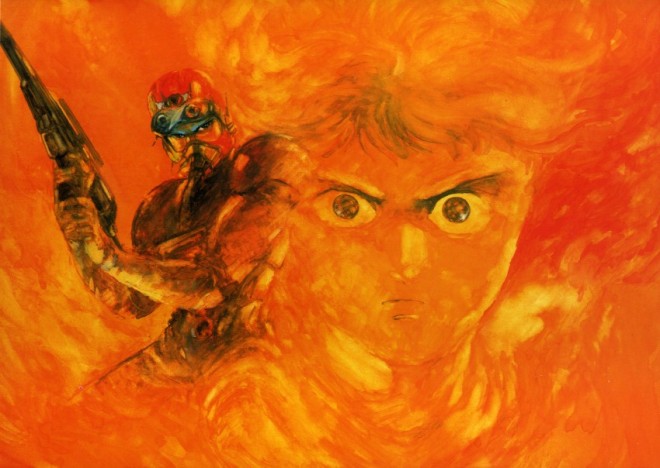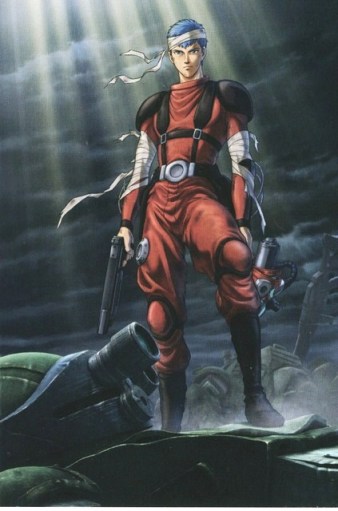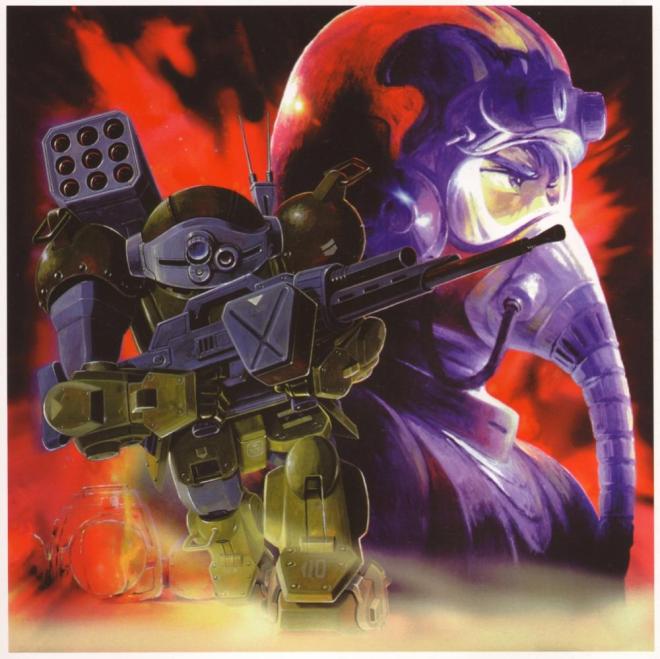
Did you ever have that feeling that, despite the fact that you had watched the same show as other people, you had somehow seen a different show than other people? This has been my experience with Sunrise’s “other” big, enduring mecha franchise, Armored Trooper Votoms. My disagreement with the discussion (that I’ve been privy to) of the show is not about the esteem in which it is held. The show is one of my absolute favorites. I think it’s really well done, and nearly every iteration of Votoms offers something worthwhile…even the most recent stuff. Not even LOGH can say that.
To be clear: this post does not really concern the Votoms franchise as a whole but mainly the original 1983-4 television show, though my comments do apply to most of the series. The reason for disparity between my own view and those of others has to do with what I think the show fundamentally is. Most people describe the show using terms like mecha, sci-fi, and action (see my own metadata) or talk about the realistic nature of the robots or grittiness of the combat. Such talk is not wrong; all of these elements are certainly present in Votoms. However, I maintain that, at its core, the show is a tragedy.
Suggested Soundtrack for Reading – Oneohtrix Point Never “Replica”
WARNING: MASSIVE SPOILERS FOR THE VOTOMS FRANCHISE BEYOND THIS POINT.
 Don’t misunderstand: I love the mecha, combat and grittiness of Votoms as much as the next fan. I think the scope dog is one of the great mecha designs in anime history, and I laud the show for being the kind of war story that it is. There aren’t easy answers to be found unlike in, say, a 00s Gundam series. I also adore the show for being the kind of science fiction story that it is, sticking to its constraints while pushing the envelope and not letting things get stale. I really dig these aspects of Votoms, but I do not think that any of them most aptly defines it, what it is at the most basic level. Ascertaining the essence of the show requires us to look at its protagonist, Chirco Cuvie.
Don’t misunderstand: I love the mecha, combat and grittiness of Votoms as much as the next fan. I think the scope dog is one of the great mecha designs in anime history, and I laud the show for being the kind of war story that it is. There aren’t easy answers to be found unlike in, say, a 00s Gundam series. I also adore the show for being the kind of science fiction story that it is, sticking to its constraints while pushing the envelope and not letting things get stale. I really dig these aspects of Votoms, but I do not think that any of them most aptly defines it, what it is at the most basic level. Ascertaining the essence of the show requires us to look at its protagonist, Chirco Cuvie.
The one constant throughout the main Votoms series and, until recently, its side stories/prequels is its main character. An examination of Chirico’s journey reveals Votoms’ genre credentials . Chirico plays the tragic hero in two different senses; one could view him as the central figure of a sort of classical Greek tragedy or as the protagonist of quite a modern one. Similar to heroes of ancient tragic plays, Chirco is “cursed” with immortality, doomed to see the humanity make the same mistakes time and again And, to be sure, Chirico comes to view his immortality as something negative. For me, this device gives the story a sort of aged feeling, despite the tech and space travel.
Even bearing in mind this allusion to classic stories, Chirico is, I think, chiefly a very modern kind of tragic hero. Essentially from the time he was born, he is brought up to be an elite warrior, perfection on the battlefield. The child solider narrative, at least one told in a tragic light, is a newish convention. Pre-modern takes on this sort of character had them retaining their personalities, poor ones though they may be. Chirico has his emotions ground out of him so that his mind and body can focus on nothing but the fight. Stories that glorify young warriors depict them as possessing their humanity, the thing that Chirico’s handlers wanted to deaden.
Classical tragedies end with the death of their protagonist. Votoms, however, does not afford this ending to Chirico, choosing instead to emphasize the modern fear of isolation. Being an immortal, he must be resigned to the notion that everyone he loves will one day die and leave him. Rather than be granted what he may likely view as a relieving release from his arduous life, Chirico is faced with the prospect of a deep emotional isolation. During the iconic ending of the TV series, he chooses to be cryogenically frozen and launched into space instead of slogging through wave after wave of inevitable battles and finding himself alone.
Now, despite the above remarks, Votoms does not definitively state that Chirico is immortal. No conclusive proof is offered, and no one makes an irrefutable argument. Chirico is not purported to be simply an ageless being; he is believed to be what is known as an “ultimate survivor.” Scientists who have watched Chirico for his entire life believe that he is immortal. Chirico himself does not seem to. The available evidence underdetermines the ultimate survivor theory. In other words, the evidence supports the hypothesis that Chirico’s skill plus some luck has helped him survive just as well as it supports the notion that he is an ultimate survivor. Votoms does not give the viewer closure on the matter. It doesn’t tell you that it’s OK to buy into this supernatural (or, at least, supranatural) phenomenon, which is the whole upshot of this point: the show isn’t giving you something to believe in, here. Viewing such things with suspicion is yet another hallmark of the fiction of modernity.
Speaking of things to believe in, my final argument that Votoms is a modern tragedy hinges on two deaths, namely that of god and Chirico’s lover. Many readers will be familiar with the tragic overtones of Nietzsche’s “Death of God” as written in his work The Gay Science. In the world of Votoms, god is a centuries-old, sentient supercomputer called Wiseman. This being who has shepherded the history of humanity wants Chirico Cuvie to be his successor, claiming to have overseen the ultimate survivor’s development. Instead, Chirico chooses to kill Wiseman. The being that brought balance and direction to the Astragius Galaxy is suddenly no more, and the human race is granted an unprecedented degree of (terrible?) freedom, unbeknownst to its inhabitants.
The death of Chirico’s lover, Fyana, is not as globally effecting; however, its impact upon Chirico seems significant. In the first act of the series, she is Chirico’s obsession. Once they actually get together, Fyana becomes the thing in his life that gives him focus, drive and a reason. Being an imperfect ultimate survivor, however, means that she dies in one of the franchise’s later OAV sequels. One would expect that the loss of such a valued person would leave her partner crushed and rudderless, at least for a time. Yet, Chirico does not outwardly mourn her passing; the battles that follow him across the universe will not allow him this luxury.
The loss of both love and god strip away any of Chirico’s possible reasons for being, beyond his own survival. More than anything else, the death of this part of Chirico’s soul functions as the equivalent of the death of the main character in a classical tragedy. This gradual hollowing out of Chirico over the course of the franchise that weighs heavy on the viewer, and the slow turning of the knife represents an alternative to the bombastic megadeath-infused ending of Greek tragedies.
Now, you may ask, “Don’t tragedies exist to communicate a set of values? How is Votoms doing that?” Well the answer is that, in a traditional sense, Votoms is not doing that. Many mecha shows, both old and new, extol the virtues of friendship, teamwork, sacrifice, hot-bloodedness, and the like. Even more serious fare like Gundam that trade on the notion of war being hell will eventually reveal that their worldview consists of propositions like, “We have faith in humanity to evolve and become better” and “Most people love peace and want to be good, so things will be alright in the end.” Votoms isn’t towing that line. I suppose if I had to come up with some moral for the series, it would be: the universe is cold, so, if you find love, grab hold of it while you can. Perhaps even that is misleading, for love only brought Chirico happiness for a season.
So, yes. I would classify Armored Trooper Votoms as primarily a piece of modern tragedy, rather than as a mecha series first. The elements of mecha are there, and I quite like how they are presented and executed, but the tragic hero’s journey eclipses them. I want to know why more people aren’t talking about that stuff.


That’s a truly stunning article. It makes me wonder why more people haven’t written about this series. You can say that I’m in the mood for tragedy now–having read the Oresteia and working on going through the rest of Aeschylus’ works. So, I’ll definitely look this anime up.
Thank you for reading!
It is an excellent show. I must immediately advise you the way I advise any new Votoms fan: watch the series in production order. Some people view it in chronological order, and this completely ruins many of the surprises (but, if you’ve read this piece, then several of the biggies are already spoiled for you!). Spoilers aside, the whole thing flows much better in the order of its production.
The TV series in particular may feel repetitive to you, if you aren’t a seasoned mecha fan. It does have the 80s genre problem of putting a complete battle in every episode, rather than having some without battle and certain battles extending over several episodes. I don’t think that studios were thinking much about the home video market back then, though.
As a classicist, I’m used to knowing everything which will happen in a story. But, the “how” and “why” of a tale are always the most interesting parts for me. You can call me a rara avis, if you like. 🙂
Fair enough!
Perhaps the reason people are not talking about this series in the way that I do is that I am a kind of rara avis, in seeing it as quite bleak.
Ok just discovered this gem myself, read some moron comparing it to Macross/Robotech…ok yes they both have giant robots but that’s about where the similarities end. If anything it’s like the old school gundam where the freaky royals were duking it out on Earth with the Zeon before the space bits, which btw is also a tragedy for the most part. But then Sunrise did that also so ya no shocker there. But seriously Macross? it was like reading a review by a guy that was told by another guy what the story was about…
[…] – Here is the Votoms piece in question. Everyone should go watch that […]